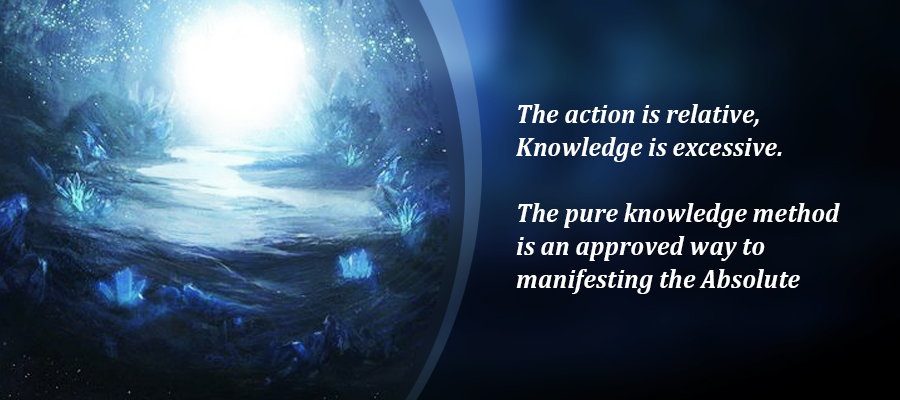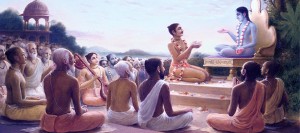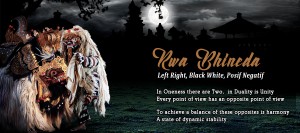In-depth investigation of the innate longing of the heart, ensuring that the One Absolute God Himself is Reality.
If Brahman is the Truth, all forms of outward experience can only arise. Brahman is not an object that must be achieved as something in space, because it is the Self of all and not the external entity that is second in the Self. It is not even an object of knowing, because only that is the subject of eternal knowledge, and the process of knowing is a psychosis which is a phenomenon.
There is no such thing as knowing Brahman because those who know Brahman cannot separate themselves from Him. This is not an object of meditation, because meditation is considered, which involves dualistic functions, and dualistic beings are not Brahman. Brahman is not achieved by thinking about anything.
Brahman is not an object of love, devotion, or worship, because all these relational categories presuppose a changing world, not essential Brahman. The Real can never be a problem to deal with in any way. Brahman cannot be seen, heard, understood or known even through millions of years of difficult objective efforts in the world of spacetime.
The Absolute transcends every function, becomes, and processes. That’s outside the mind, emotions, willpower, feelings, sensations, certainty, names, forms and actions. An individual as an individual will never know what is not an individual. We cannot know what is not from our core. Everything we know and experience does not exceed our potential or our manifestations.
Every creature is confined in its own experience and cannot know apart from itself. Knowing and being are one and the same, and therefore, we cannot know something without becoming it. Everything outside of us is a reflection of our awareness and in the end there is nothing that does not exist in our consciousness.
Whatever we are, that’s all. However, the extension of this subject to the objects of perception in the world of awareness of relative individuality, psychological, and from the point of view of Consciousness itself, is metaphysical. While the form in which an object is known by the subject is relatively distinctive in its own mode of cognitive organism, the reality underlying this form is not governed by the categories through which the subject’s cognitive organs operate in knowing that form.
The existence of the person perceived is not contained in and controlled by conditions of consciousness that are objectified from the person who perceives by subject to these conditions. The world is not the creation of a particular individual’s thought process, even though all the details given from the known object to the knowing subject are what is cast into the mold of the knowing organ’s internal organs.
Even though there is an objective reality that is known as having a form by the subject through psychological modification, it must be accepted that, as far as the subject is concerned, his experience is the truth, whether external objects exist or not as a reality in themselves. When looking at the level at which the subject is relatively standing, what becomes clear is that the subject’s experience that cannot be separated from his objective awareness is his personal condition, however, from the point of view, an external object exists, without acknowledging whichever one belongs to him, the experience cannot be justified.
If there is no real object, there can’t be any real subject either. The level of reality revealed by the subject and which proves its existence is also present in the object, although the relative reality of this object can be sublated when the conditions under which the subject perceives this object are sublated through higher knowledge of an object. deeper essence of himself. This is the individualistic significance of object dependence on the subject. what becomes clear is that the subject’s experience that cannot be separated from his objective awareness is his personal condition, however, from his point of view external objects exist, without recognizing for which his own experience cannot be justified.
But in such a consciousness, the entire objective nature of the world will be ignored, even without the slightest ignorance in the form of the idea of the momentary reality of consciousness.
In Consciousness, the universe is transformed and realized as itself. Whatever is known is Consciousness and nothing else. Consciousness is the Absolute and therefore no objective reality can be positioned in relation to it. Although the objective world which is equivalent in reality to the subject is relatively known to exist from the subject’s perspective, whatever degree of reality it manifests, regardless of the categories to which it is bound and wherever it has the experience, no such external world can exist. exist in Pure Consciousness, because it does not merge or perceive through thought or reason and senses, and its experience is direct, non-relative.
This is Self-Knowledge and not knowledge of an object or state of being. In the Absolute, there is no external awareness, no objective psychological processes, no dualistic reality. However, in individual circumstances, there is a subjective experience of objective reality that has a dual nature of the subject’s knowledge or experience of his condition and the conditions of the external world, and the external world itself is independent of the experience of the subject.
The conception of the nature of Reality is a modification of internal organs that act within the boundaries of space, time and cause and effect. When the thought crosses these categories, there is no more thought and no cognitive function. As long as we feel that we are not Brahman, Brahman for us is only what we think. Therefore, all of these processes are intended to lead us to the realization of limited, and imperfect truths in themselves.
“The Eternal is not attained through the impermanent” – Katha Up., II. 10





